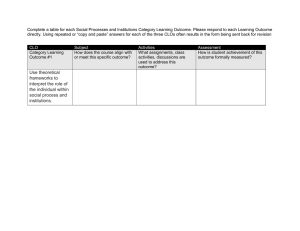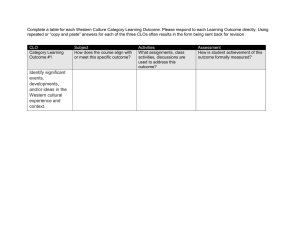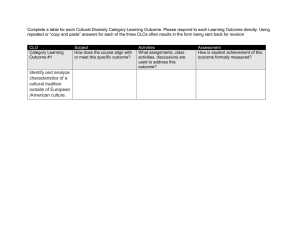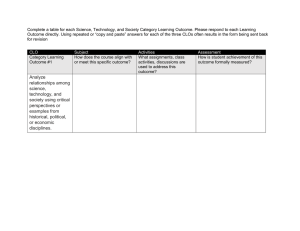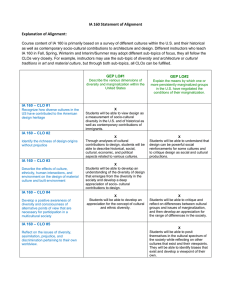Assessment Day Proposal 4/08
advertisement
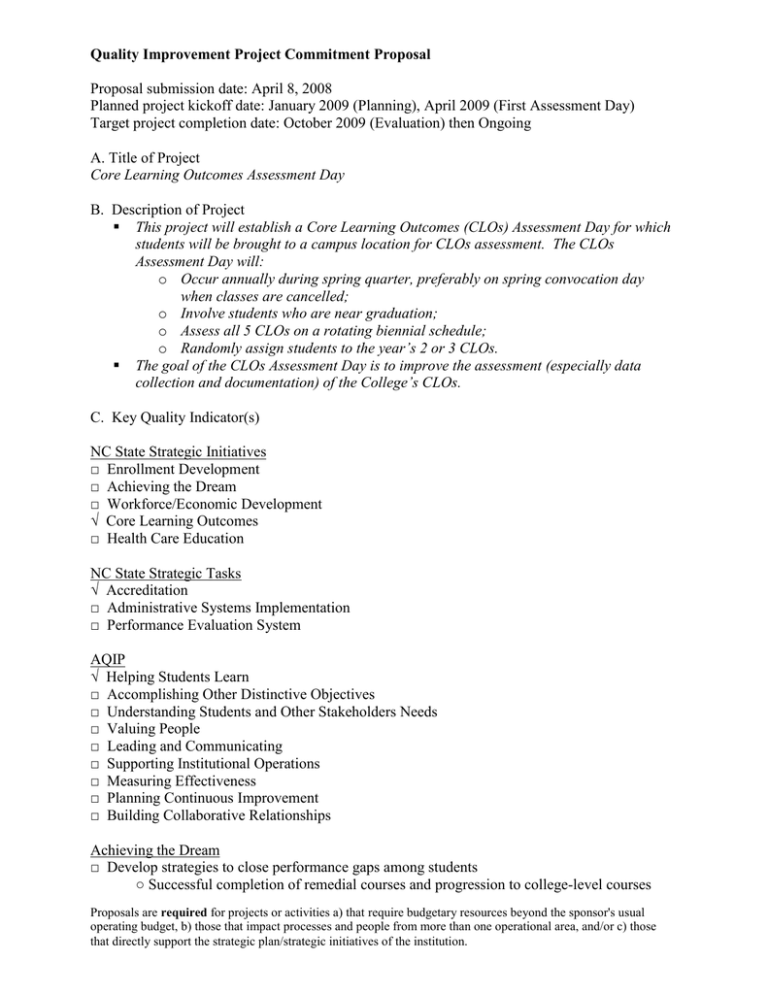
Quality Improvement Project Commitment Proposal Proposal submission date: April 8, 2008 Planned project kickoff date: January 2009 (Planning), April 2009 (First Assessment Day) Target project completion date: October 2009 (Evaluation) then Ongoing A. Title of Project Core Learning Outcomes Assessment Day B. Description of Project This project will establish a Core Learning Outcomes (CLOs) Assessment Day for which students will be brought to a campus location for CLOs assessment. The CLOs Assessment Day will: o Occur annually during spring quarter, preferably on spring convocation day when classes are cancelled; o Involve students who are near graduation; o Assess all 5 CLOs on a rotating biennial schedule; o Randomly assign students to the year’s 2 or 3 CLOs. The goal of the CLOs Assessment Day is to improve the assessment (especially data collection and documentation) of the College’s CLOs. C. Key Quality Indicator(s) NC State Strategic Initiatives □ Enrollment Development □ Achieving the Dream □ Workforce/Economic Development √ Core Learning Outcomes □ Health Care Education NC State Strategic Tasks √ Accreditation □ Administrative Systems Implementation □ Performance Evaluation System AQIP √ Helping Students Learn □ Accomplishing Other Distinctive Objectives □ Understanding Students and Other Stakeholders Needs □ Valuing People □ Leading and Communicating □ Supporting Institutional Operations □ Measuring Effectiveness □ Planning Continuous Improvement □ Building Collaborative Relationships Achieving the Dream □ Develop strategies to close performance gaps among students ○ Successful completion of remedial courses and progression to college-level courses Proposals are required for projects or activities a) that require budgetary resources beyond the sponsor's usual operating budget, b) those that impact processes and people from more than one operational area, and/or c) those that directly support the strategic plan/strategic initiatives of the institution. ○ Enrollment in and successful completion of “gatekeeper” courses. ○ Productive grades (C- or better) in all courses. ○ Improve term-to-term persistence. ○ Improve graduation rates. √ Use data to drive strategies, monitor progress and evaluate outcomes □ Involve faculty, students, staff and communities in developing and implementing □ Report data and outcomes broadly, both on and off campus; advocate for state and national policy □ Form partnerships with communities, local businesses and others D. Project Relevance and Legitimacy Priority: o CLO assessment is one of the College’s strategic initiatives, is a requirement for accreditation, is addressed in Ohio’s Strategic Plan for Higher Education 2008 2017, and provides important feedback on student learning. Research: o The Strategic Plan for Higher Education 2008 – 2017 report states that: “The community colleges’ accountability system will: 1. Measure and report student engagement by utilizing the CCSSE as its survey tool. 2. Assess general education outcomes through the development of a common template, which will be used to report general education outcomes, measurements used and results, and share information on how the results will be used to make improvements (p. 110). o The Assessment Committee, sponsor of this project, has encountered difficulty in conducting CLO assessment under the current system. The current system relies on faculty to administer assessment tools in capstone courses. This has presented logistical challenges that will worsen as we add more CLO assessment to the mix. Also, participation by faculty in the WAC/SpAC assessment of the communication CLO has declined over the last three years despite the efforts of the Assessment Committee. E. Organizational Impact The Coordinator of Student Assessment Services (Cathy Craig) in the Student Success Center (SSC) is responsible for CLO Assessment Days under the recent restructuring of the SSC. The role of the Institutional Research Department will be reduced in terms of the logistics of CLO assessment but will continue with interpreting and reporting the results of CLO assessment in conjunction with the Assessment Committee and Assessment Coordinator. The Assessment Committee will continue to lead in CLO assessment to include setting the CLO assessment schedule, refining CLOs and their assessments, and communicating results. The College (students, faculty, staff, and administration) and the College’s community (local, statewide through the Ohio Board of Regents’ student success plan, and regional through accreditation) are stakeholders in this process. Resources needed for ongoing biennial assessment schedule o For 08/09 and biennially: o CAAP Critical Thinking: (100 tests and report) Cost = $1560. Proposals are required for projects or activities a) that require budgetary resources beyond the sponsor's usual operating budget, b) those that impact processes and people from more than one operational area, and/or c) those that directly support the strategic plan/strategic initiatives of the institution. o Culture and Community Essay / Writing Assessment: (To evaluate 100 student essays -- 12 hours for 8 faculty from English and Humanities/Social Science departments x $16/hour) Cost = $1536. o Speech Assessment: (To evaluate 30 speeches videorecorded or live in capstone courses – 30 hours for faculty from Speech department x $16/hour) Cost = $480. o Proctors for Assessment Day: (4 people for 4 hours x $16/hour) Cost = $256. o Refreshments for Students: Cost = $1000. o TOTAL BIENNIAL COST = $4832. o For 09/10 and biennially: o CCSSE survey: Cost = $4500, part of AtD budget. o Computer Literacy: (100 tests at $7 each) Cost = $700. o Computation Skills: (100 COMPASS tests, math portion, at $2 each) Cost = $200. o Proctors for Assessment Day: (4 people for 4 hours x $16/hour) Cost = $256. o Refreshments for Students: Cost = $1000. o TOTAL BIENNIAL COST = $6656. Please note that the costs that are additional due to the Assessment Day proposal are for proctors and refreshments. All other costs are for CLO assessment tools and processes, modified from previously approved plans. F. Key Processes The key process affected by this project is assessment of core learning outcomes. G. Timeline/Milestones March 09: Planning for Assessment Day completed. April 09: Assessment Day conducted. June 09: Evaluation of Assessment Day completed with recommendations for improvement. Annually: Assessment Days conducted. H. Project Monitoring Monitoring of this project is the responsibility of the Assessment Coordinator and the Assessment Committee. I. Assessment Outcome measures include the deliverables described in section G. Success will also be indicated with the complete and timely documentation of CLO assessment results. J. Other Information CLO assessment information is available at http://www.ncstatecollege.edu/studentsuccessplan/default.htm K. Project Leader/Contact Person (First Name, Middle Initial, Last name, Title, Email, Telephone) Kate Peresie, Assessment Coordinator, kperesie@ncstatecollege.edu, ext. 4849. Date Received Planning Fwd To □ AQIP Date Sent □ Date Returned □ Recommended By PAC? □ Yes Proposals are required for projects or activities a) that require budgetary resources beyond the sponsor's usual operating budget, b) those that impact processes and people from more than one operational area, and/or c) those that directly support the strategic plan/strategic initiatives of the institution. Advisory Committee □ No □ AtD □ □ Date: □Assessment □ □ □ Curriculum □ □ □ Other □ □ Date Received from PAC Date Returned To PAC Recommended To PAC? AQIP Steering Committee Achieving the Dream Core Team Assessment Committee □ Yes □ No Curriculum Committee □ Yes □ No □ Yes □ No □ Yes □ No Proposals are required for projects or activities a) that require budgetary resources beyond the sponsor's usual operating budget, b) those that impact processes and people from more than one operational area, and/or c) those that directly support the strategic plan/strategic initiatives of the institution.
